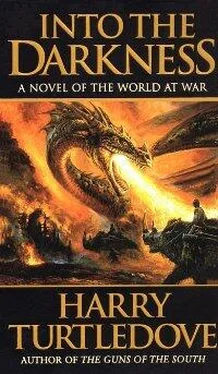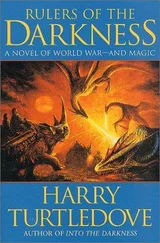Zaban prostrated himself before his sovereign. Hajjaj bowed low, as he would have done with King Shazli. King Swemmel spoke in Unkerlanter. Hajjaj followed fairly well, but waited to respond till Zaban translated his words into Algarvian: “You are insolent. All Zuwayzin are insolent, we think.”
“We have our own opinion of Unkerlanters,” Hajjaj replied. He intended to yield as little as he could, here or anywhere else. “Our opinion is lower now that Unkerlant has broken the Treaty of Bludenz.”
“Kyot made that treaty,” Swemmel said. His eyes bored into Hajjaj. “Kyot is dead, slowly dead, horribly dead. Less than he deserved. And Zuwayza is beaten. Would you be here, were Zuwayza less than beaten?”
He might well have been mad. Mad or not, he was right. Hajjaj did his best not to acknowledge it, saying, “We have hurt you. If you press us too hard, we can hurt you more, much more. Your ultimatum was too harsh. If your demands now are too harsh, we will go on fighting. You may, perhaps, eventually gain all of what you want, but you will pay an enormous price for it. Would you not rather settle for a bit less, knowing you do not have to pay so much?”
That was sensible, rational, reasonable. Glancing at King Swemmel, Hajjaj realized with a shiver that none of those words was apt to apply to him. Swemmel’s eyes seemed made of obsidian, with the thinnest layer of glittering Unkerlanter ice above. The king said. “We do not care what we pay. We want what is ours.”
I will not give way to despair, Hajjaj thought, and then wondered why. He started to form another polite, diplomatic reply. He rejected the words before they passed his lips. Whatever Swemmel responded to, it was not polite diplomacy. Hajjaj tried a different tack: “Your Majesty, it is even so with us of Zuwayza. Were it not, why would we have risen against Unkerlant so often, even with little hope of victory?”
He watched Swemmel carefully. The king’s eyes narrowed, then widened. The ice, or some of it, melted. The hard, shiny stone beneath remained. But Hajjaj had got through to him, at least to some degree, for he said, “Aye, you arc a stubborn folk,” and said it in the tones of a man doling out a grudging compliment. He stabbed out a forefinger at Hajjaj. “You may be stubborn, but you are beaten. Else you yourself would not be here.”
“We are beaten.” The Zuwayzi foreign minister conceded what he could hardly deny. “We are beaten badly enough to have to yield you some of what you demand of us. We are not beaten so badly as to have to yield it all.”
“Shall we treat Shazli the pretender as we treated Kyot the usurper?” Swemmel asked.
“Zuwayzi lords know how to die,” Hajjaj said, as steadily as he could. Again, he gave the king the directness Swemmel did not look to get from his own subjects: “Unkerlant has given them much practice in the art.”
Zaban looked at him with a face the color of whey. No, no one in Cottbus spoke to King Swemmel so. Hajjaj gestured harshly. The man from the Unkerlanter foreign ministry did translate accurately; Hajjaj knew enough of his language to be sure of that. He waited on Swemmel. The Unkerlanter king might want to find out how well he died. That violated every law of diplomacy, but King Swemmel was a law unto himself.
Swemmel hunched forward on his high seat, like a hawk about to spring into the air from a falconer’s wrist. In a voice harsh as a hawk’s, he said, “We shall dicker.” Hajjaj breathed again, but tried not to let the king of Unkerlant see him do it.
Krasta was angry. Krasta was frequently angry, but most often at people she knew, not at whole kingdoms. Now her outrage stretched far enough to encompass all of Valmiera.
“Will you look at this, Bauska?” She waved the news sheet in the serving woman’s face. “Will you look at it?”
“I see it, milady.” Bauska kept as much of herself from her voice as she could, leaving Krasta next to nothing to seize on.
But Krasta needed next to nothing. “Unkerlant has won another war,” she snarled. “The western barbarians have won two wars now, against Forthweg and against this Zuwayza place, wherever it may be. The Unkerlanters have won two wars. Has Valmiera won even one war? Has it, Bauska?”
“No, milady,” the servant answered. But then, no doubt rashly, she added, “Unkerlant hasn’t fought the Algarvians, though.”
Krasta tossed her head. A golden curl escaped the pins Bauska had put in her hair earlier in the morning and slid under her nose, as if she’d suddenly grown a mustache. Sniffing, she brushed it aside. Sniffing in a different way, she said, “The Algarvians are barbarians, too. They should have stayed in their forests a long time ago, and not come out to bother civilized people.” By that, of course, she meant people of Kaunian blood, her notion of civilization extending no further.
“No doubt, milady,” Bauska said. Having got away with one additional comment, she tried another: “They may be barbarians, but they’re monstrously good at war.”
“We’ve beaten them before,” Krasta said. “They didn’t win the Six Years’ War, did they? Of course they didn’t. Valmiera won the Six Years’ War. Oh, we had a little help from Jelgava, but we won it.” Jelgavans were of Kaunian stock, too; she acknowledged their existence. Sibian? Lagoans? Unkerlanters? They’d fought side by side with Valmiera, too. As far as she was concerned, they might as well have stayed out of the war. How it would have ended had they stayed out never entered her mind.
“Powers above grant we win this war, too, milady,” Bauska said. “And powers above grant that your brother comes home safe from it.”
“Aye,” Krasta said; the serving woman had hit on a way of mollifying her, at least for the moment. “As of his last letter, Skarnu was well.” She paused. She might have let it go there, but she still held the news sheet. Seeing it rekindled her anger. “Skarnu is well, but we have not broken through into Algarve. How can we hope to win this miserable, inconvenient war if we can’t break through?” Her voice rose to a shout once more.
“Milady, I know not. How can I know? I am a maidservant, not a warrior.” Bauska bowed her head. In a barely audible voice, she asked, “Have I your leave to go, milady?”
“Oh, very well,” Krasta said in some annoyance; she usually got more sport out of baiting her servant. Bauska retreated much faster than the Algarvian army had fallen back before Valmiera’s foes. But she did not retreat fast enough. Krasta snapped her fingers. “No. Wait.”
“Milady?” Bauska froze near the doorway. Her voice might have been a fragment of winter wind let loose within the mansion.
“Come here. I have a question for you,” Krasta said. The serving woman came much more slowly than she had gone. Krasta went on, “I’ve been meaning to ask you this for some little while now, but it keeps slipping my mind.”
“What is it, milady?” Bauska still looked alarmed, which was good, and also curious, which was acceptable.
“When you are with your sweetheart, do you ever pleasure him by taking his member in your mouth?” Krasta asked her question as matter-of-factly as she would have asked a farmer about stockbreeding. In her mind, the differences between livestock and servants were not large.
Bauska’s fair skin flushed bright red. She coughed and turned away, but she did not dare flee the chamber again, not unless Krasta told her she might. When at last she spoke, it was in a prim near-whisper: “Milady, I have not got a sweetheart, so I do not know what to say to you.”
Krasta laughed in her face, knowing a servant’s evasions when she heard them. “Curse it, have you ever pleasured a man so?” she demanded.
Читать дальше












